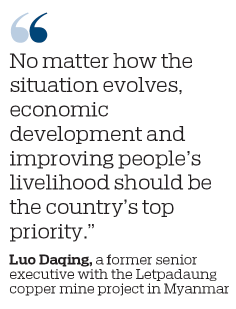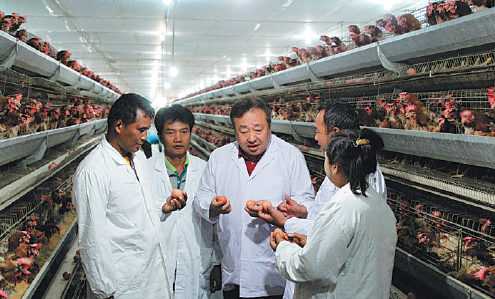Man who once brokered peace in Myanmar hopes bad times will pass

Luo Daqing, a former senior executive attached with the Letpadaung copper mine project at Monywa in northwest Myanmar's Sagaing region, has been closely watching the situation unfolding in the southeast Asian nation from his home in Beijing.
On the morning of February 1, Luo, 61, woke up to the news of the Myanmar military detaining senior Myanmar officials, including President Win Myint and State Counsellor Aung San Suu Kyi.
After his almost nine-year-long association with Myanmar, Luo says he has a sentimental attachment with the country.
He worked as deputy general manager at the Myanmar Wanbao Mining Copper Ltd from 2011 till his superannuation in 2019, spending most of his time working with the communities living around the Letpadaung copper mine.
He is worried the political unrest in the country can impact the mining project, particularly the people living in its vicinity. He is sad at the escalation in violence across Myanmar, as well as the attacks on Chinese companies in Yangon.
"I witnessed the ground-breaking ceremony for the mine's construction, lived through the most difficult phase there when locals were protesting against us, prompting us to hold consultations," Luo said.
"We were overjoyed when the project finally manufactured the first copper plate." The project brought tangible benefits to the local communities, becoming an example of win-win cooperation between Myanmar and China.
However, because of the recent turmoil, the mine has suspended production. According to Luo, local communities that benefited from the project's supply chains, providing transportation, quarrying and other services, are eagerly waiting for normalcy to return and business to resume.
Luo's company took up the Letpadaung project in March 2012, when Myanmar was undergoing a rapid democratization process.
The changes in Myanmar' politics, coupled with problems arising from relocation, compensation for land and locals' environmental concerns, triggered intermittent protests against the project, because of which construction work was suspended in November 2012.
"The political and social risks involved put us in despair as huge sums had been invested," Luo said.
The Myanmar government appointed a probe panel led by then opposition leader and parliamentarian Aung San Suu Kyi.
The panel's final report, submitted to then Myanmar president Thein Sein on March 12, 2013, proposed that the project should go on, as it was in the economic interests of the nation and its people, especially the future generation. It asked the project operator to address local concerns, by holding community consultations, and win the social license to operate the project.
"Given the political and social risks involved, we realized we must build mutual understanding and trust with the stakeholders, including the Myanmar government and local communities," Luo said.
Luo led a team comprising of Chinese and Myanmar employees to hold talks with the communities, and worked out various plans to alleviate their concerns about compensation for land, environmental concerns, community development and so on.
"That was a really tough job," Luo said. "We went from village to village, door to door. We took note of their grievances and explained to them the company's policy for community support. Based on our findings, we worked out means to allay their livelihood concerns after land loss, by creating jobs, setting up vocational training and supporting the development of small and medium-sized enterprises."
The company Luo worked for accommodated villagers who lost their land to the project in construction, transport, well-sinking, quarrying and wood-processing teams, brick kilns, cement pipe factories and poultry farms.
"This was something new for a mining company like ours. It was difficult but we wanted to show them that Wanbao takes its social responsibility seriously," Luo said.
"We know SMEs are the real path to a truly prosperous community around us. They are also the heart of Myanmar's economic development. Our strategy was to create alternative and sustainable sources of employment by promoting skill development, knowledge transfer and industrialization in the area."
TunTun, 39, a resident of Kandaw New village near the mine, was a driver in Luo's company. He resigned later to lead a transportation team. "He is a household name in the villages near Letpadaung because of his generosity," says TunTun of Luo. "He would often turn up under the scorching sun to talk to us. He helped us a lot."
Thanks to painstaking efforts by Luo and his team, the Letpadaung copper project survived. Full production began in 2019 and the project has become a model for Belt and Road cooperation between China and Myanmar.
When Luo left the mine for Beijing in December 2019, hundreds of people from the nearby villages came to see him off. Luo's efforts had paid off. The frost that once existed between locals and his company had all melted away.
Speaking of the situation in Myanmar, Luo said Myanmar remains one of the least developed countries in the world, and development should be its first priority. "Foreign direct investment is a must for the country's development, but for that there should first be a stable political environment," he said.
After attacks on factories with Chinese investment in the Hlaingthaya area on the outskirts of Yangon left many personnel injured and trapped last month, the Chinese Embassy in Myanmar issued a statement calling on the authorities in the country to take effective measures. The Foreign Ministry also expressed concern over the safety of Chinese nationals in Myanmar as anti-China sentiments were being incited.
Luo said he was relieved that no protest or violent activity has been reported from the Letpadaung copper mine area. "I think the communities there are aware that the project benefits them," Luo said. "Although some employees and locals have joined the civil disobedience movement, they are not protesting against Chinese investment as they did years ago."
The long-term effect of the political turmoil in Myanmar remains unknown, but Luo swears by foreign investment. "No matter how the situation evolves, economic development and improving people's livelihood should be the country's top priority," he said. Also, he hopes stability returns soon to Myanmar so that the Letpadaung project can continue helping the country and people's lives.
caodesheng@chinadaily.com.cn






















